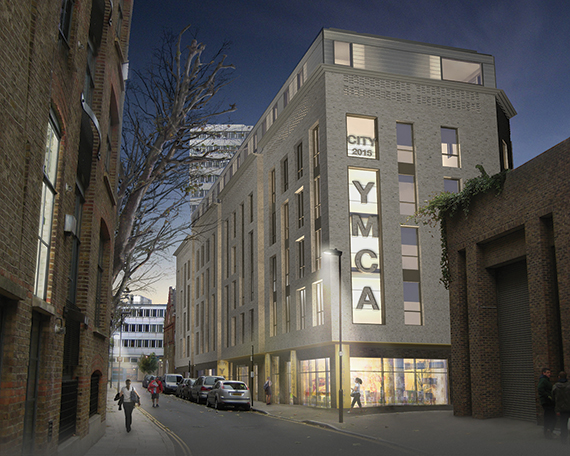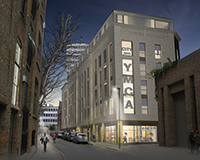
For 30 years, LandAid has brought together remarkable businesses and individuals from across the property industry to achieve lasting change. At a gala dinner at Guildhall this week, in the presence of HRH The Duke of Cambridge, we outlined our greatest challenge yet. With this industry’s continued generosity, we want to support a hostel for young homeless people. And, for the first time, it will bear the name of the property industry’s own charity: LandAid House.
Every year thousands of young, homeless people try to start over, beginning their difficult journey in one of our many homeless hostels. Yet one of those, the 114-bed City YMCA at Errol Street in central London, is just being demolished.
Far from being lost forever, however, an extraordinary state-of-the-art building will replace the old hostel, with rooms for 146 young people. This week, LandAid launches an appeal to raise at least £1.5m over the next 18 months to make this building a reality for young people at risk.
LandAid House will provide 24/7 specialist support to young people who have been homeless, underpinning their courage and aspirations with a physical design that is both innovative and award-winning.
Dean fled a troubled home and, like many others, came to London to try to make something of his life. Without money or support, he quickly ended up sleeping rough in parks and doorways. After six weeks on the streets, he was helped to access one of the only year-round night shelters; later, he got a place at Errol Street.
While his room was warm, and an improvement on the shared dormitory where he had slept previously, it was noisy. Sleeping was hard, and with nowhere to cook or eat other than in the canteen, he was never going to master the basic skills he needed to live on his own.
Built in the 1980s, Errol Street was designed to provide accommodation, not to support transformation. After four years of meticulous research and consultation, the team at City YMCA, London, have designed a building that will do just that.
Instead of small, identical rooms sprouting off long and dark corridors, residents will live in beautifully designed clusters of flats built around shared cooking and living areas. There will be comfortable areas for young people to meet, as well as to work and study, and there is a gym – not only for residents, but for the local community, helping to bring neighbours in to the centre rather than keeping them away.
Crucially, as residents become more confident and better able to look after themselves, they can move internally to more self-contained accommodation in smaller pods, honing their skills and preparing for independent living.
So impressive has the attempt been to meet the needs of its future residents in sensitive and thoughtful design that the new building was shortlisted for the 2014 Housing Design Awards.
At LandAid, we are constantly amazed by the resilience, optimism and ambition of young people who have faced homelessness – young people like Dean. The design of the new LandAid House and the philosophy of the City YMCA team is focused on what residents can do, not what they can’t, and on building on the foundations each young person has.
As the new centre rises from its own foundations, and with an official opening due in autumn 2018, we need the property industry to help in any way it can. Help us help Dean and the thousands of other young people who, like him, want to start over, and deserve our support in doing so.
The increasing mayoral focus on homelessness
After years of decline in the number of rough sleepers from the dark days of Waterloo’s cardboard city in the late 1990s, homeless is again on the rise in London.
Cuts to public services and rising housing costs have led to the number nearly doubling in the last five years, around 8,000.
London mayor Sadiq Khan has made addressing that a key policy of his tenure, as part of his wider fight against the London housing crisis.
He laid out plans for a £50m fund to help homelessness at the end of 2016, alongside the £9m the GLA spend each year, which will help deliver properties specially earmarked for people needing to move on from hostels and refuges, alongside other at risk groups.
“Homelessness is a complicated problem and it will take time to turn things around, but I am determined we will do everything we can to support people from becoming homeless and help them if they do,” he said.
The GLA has also set up the No Nights Sleeping Rough task force, chaired by the deputy mayor for housing James Murray. This is intended to bring together players to prevent rough sleeping and focus their efforts on interventions and lobbying to government for support where needed.
To find out how you can support the LandAid House appeal, please contact Paul Morrish on 020 3102 7190 or at paul.morrish@landaid.org











